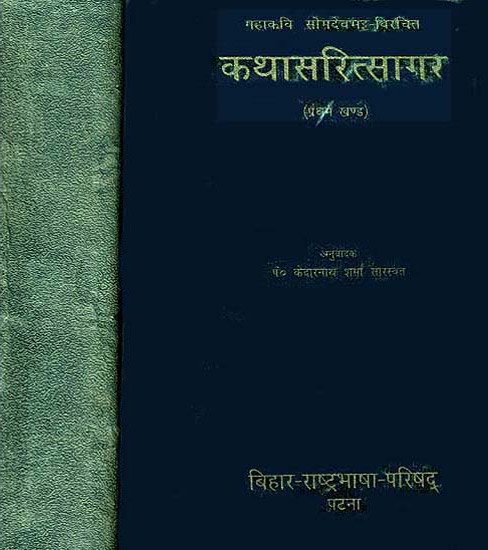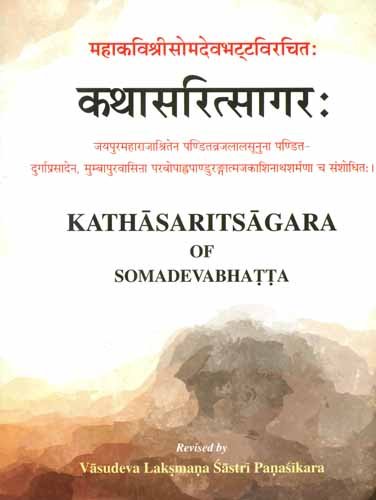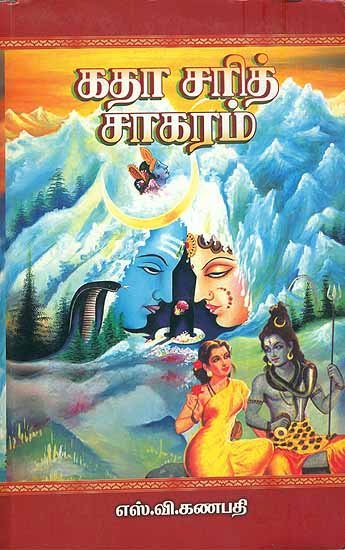Kathasaritsagara [sanskrit]
by C. H. Tawney | 2014 | 226,424 words | ISBN-13: 9789350501351
The Sanskrit edition of the Kathasaritsagara referencing the English translation and grammatical analysis. Written by Somadeva and dating from the 12th century, the Kathasaritsagara (or Katha-sarit-sagara) represents an epic legend narrating the adventures of Naravahanadatta as he strives to become the destined emperor of the Vidyadharas. Alternative titles: (Kathāsaritsāgara, कथासरित्सागर, Kathā-sarit-sāgara)
Verse 12.36.214
कोषेषु व्यलसन्निपीतमधवो ये कैर् अवाणां चिरं लब्धाभ्यन्तरसुस्थिता विकसतामिन्दुप्रभासंगमे ।
ते संकोचम् उपागतेषु विगलच्छ्रीकेषु तेष्व् अन्यतो भृङ्गाः पश्य कुमार यान्ति मलिनाः कस्य स्थिरा ह्य् आपदि ॥ २१४ ॥
koṣeṣu vyalasannipītamadhavo ye kair avāṇāṃ ciraṃ labdhābhyantarasusthitā vikasatāminduprabhāsaṃgame |
te saṃkocam upāgateṣu vigalacchrīkeṣu teṣv anyato bhṛṅgāḥ paśya kumāra yānti malināḥ kasya sthirā hy āpadi || 214 ||
The English translation of Kathasaritsagara Verse 12.36.214 is contained in the book The Ocean of Story by C.H. Tawney. This book is available online or you could buy the latest edition:
Read online Buy now! The English translation by C.H. Tawney (2014)
Glossary of Sanskrit terms
Note: This extracts Sanskrit terms and links to English definitions from the glossary, based on an experimental segmentation of verse (12.36.214). Some terms could be superfluous while some might not be mentioned. Click on the word to show English definitions.
Kosha, Vya, Nipita, Yah, Yat, Kairava, Ciram, Cira, Labdhri, Labdha, Abhyantara, Susthita, Vikasat, Vikasata, Induprabha, Asangama, Tad, Yushmad, Sankoca, Upagata, Anyatah, Bhringa, Pashya, Kumara, Yantin, Yanti, Malina, Kah, Kim, Apad,
Analysis of Sanskrit grammar
Note: this is an experimental feature and only shows the first possible analysis of the Sanskrit text (Kathasaritsagara Verse 12.36.214). If the system was successful in segmenting the sentence, you will see of which words it is made up of, generally consisting of Nouns, Pronouns, Verbs, Participles and Indeclinables. Click on the link to show all possible derivations of the word.
- Line 1: “koṣeṣu vyalasannipītamadhavo ye kair avāṇāṃ ciraṃ labdhābhyantarasusthitā vikasatāminduprabhāsaṃgame ”
- koṣeṣu -
-
koṣa (noun, masculine)[locative plural]
- vya -
-
vi (indeclinable adverb)[indeclinable adverb]vi (indeclinable preposition)[indeclinable preposition]vi (noun, masculine)[compound], [adverb], [nominative dual], [vocative dual], [accusative dual]vi (noun, neuter)[compound], [adverb], [nominative single], [vocative single], [accusative single]ve (noun, masculine)[adverb]vya (noun, masculine)[compound], [vocative single]vī (noun, feminine)[compound], [adverb]vī (noun, masculine)[compound], [adverb]vī (noun, neuter)[compound], [adverb], [nominative single], [vocative single], [accusative single]vi (Preverb)[Preverb]
- alasan -
-
√las (verb class 1)[imperfect active third single], [imperfect active third plural]
- nipītam -
-
nipīta (noun, masculine)[adverb], [accusative single]nipīta (noun, neuter)[adverb], [nominative single], [accusative single]nipītā (noun, feminine)[adverb]
- adhavo* -
-
√dhav (verb class 1)[imperfect active second single]√dhū (verb class 1)[imperfect active second single]
- ye -
-
ya (noun, masculine)[nominative plural]yā (noun, feminine)[nominative dual], [accusative dual]yaḥ (pronoun, masculine)[nominative plural]yat (pronoun, neuter)[nominative dual], [accusative dual]yā (pronoun, feminine)[nominative dual], [accusative dual]
- kairavāṇām -
-
kairava (noun, masculine)[genitive plural]kairava (noun, neuter)[genitive plural]
- ciram -
-
ciram (indeclinable)[indeclinable]cira (noun, masculine)[adverb], [accusative single]cira (noun, neuter)[adverb], [nominative single], [accusative single]cirā (noun, feminine)[adverb]
- labdhā -
-
labdha (noun, masculine)[compound], [vocative single]labdha (noun, neuter)[compound], [vocative single]labdhṛ (noun, masculine)[nominative single]labdhṛ (noun, feminine)[nominative single]labdhā (noun, feminine)[nominative single]√labh -> labdha (participle, masculine)[vocative single from √labh class 1 verb]√labh -> labdha (participle, neuter)[vocative single from √labh class 1 verb]√labh -> labdhā (participle, feminine)[nominative single from √labh class 1 verb]√labh (verb class 1)[periphrastic-future active third single]
- abhyantara -
-
abhyantara (noun, masculine)[compound], [vocative single]abhyantara (noun, neuter)[compound], [vocative single]
- susthitā* -
-
susthita (noun, masculine)[nominative plural], [vocative plural]susthitā (noun, feminine)[nominative plural], [vocative plural], [accusative plural]
- vikasatām -
-
vikasat (noun, masculine)[genitive plural]vikasat (noun, neuter)[genitive plural]vikasatā (noun, feminine)[accusative single]√vikas -> vikasat (participle, masculine)[genitive plural from √vikas class 1 verb]√vikas -> vikasat (participle, neuter)[genitive plural from √vikas class 1 verb]√vikas (verb class 1)[imperative active third dual], [imperative middle third single]
- induprabhā -
-
induprabha (noun, masculine)[compound], [vocative single]induprabhā (noun, feminine)[nominative single]
- asaṅgame -
-
asaṅgama (noun, masculine)[locative single]
- Line 2: “te saṃkocam upāgateṣu vigalacchrīkeṣu teṣv anyato bhṛṅgāḥ paśya kumāra yānti malināḥ kasya sthirā hy āpadi ”
- te -
-
ta (noun, masculine)[locative single]ta (noun, neuter)[nominative dual], [vocative dual], [accusative dual], [locative single]tā (noun, feminine)[nominative dual], [vocative single], [vocative dual], [accusative dual]tad (noun, neuter)[nominative dual], [accusative dual]sa (noun, masculine)[nominative plural]sā (noun, feminine)[nominative dual], [accusative dual]yuṣmad (pronoun, none)[dative single], [genitive single]
- saṅkocam -
-
saṅkoca (noun, masculine)[adverb], [accusative single]saṅkoca (noun, neuter)[adverb], [nominative single], [accusative single]
- upāgateṣu -
-
upāgata (noun, masculine)[locative plural]upāgata (noun, neuter)[locative plural]
- Cannot analyse vigalacchrīkeṣu*te
- Cannot analyse teṣv*an
- anyato* -
-
anyataḥ (indeclinable)[indeclinable]
- bhṛṅgāḥ -
-
bhṛṅga (noun, masculine)[nominative plural], [vocative plural]bhṛṅgā (noun, feminine)[nominative plural], [vocative plural], [accusative plural]
- paśya -
-
paśya (noun, masculine)[compound], [vocative single]paśya (noun, neuter)[compound], [vocative single]√paś -> paśya (participle, masculine)[vocative single from √paś class 10 verb]√paś -> paśya (participle, neuter)[vocative single from √paś class 10 verb]
- kumāra -
-
kumāra (noun, masculine)[compound], [vocative single]kumāra (noun, neuter)[compound], [vocative single]
- yānti -
-
yāntin (noun, masculine)[compound], [adverb]yāntin (noun, neuter)[compound], [adverb], [nominative single], [accusative single]yāntī (noun, masculine)[adverb]yāntī (noun, feminine)[compound], [adverb], [vocative single]yāntī (noun, neuter)[compound], [adverb], [nominative single], [vocative single], [accusative single]
- malināḥ -
-
malina (noun, masculine)[nominative plural], [vocative plural]malinā (noun, feminine)[nominative plural], [vocative plural], [accusative plural]
- kasya -
-
√kas -> kasya (absolutive)[absolutive from √kas]ka (noun, masculine)[genitive single]ka (noun, neuter)[genitive single]kaḥ (pronoun, masculine)[genitive single]kim (pronoun, neuter)[genitive single]
- sthirā* -
-
- Cannot analyse hy*āp
- āpadi -
-
āpad (noun, feminine)[locative single]
Other editions:
Also see the following editions of the Sanskrit text or (alternative) English translations of the Kathasaritsagara Verse 12.36.214
Kathasaritsagar
by Kedarnath Sharma Saraswat (2005)
The Only Edition with the Sanskrit Text and its Hindi Translation (An Old and Rare Book) Set of 3 Vol.
Buy now!
Kathasaritsagara of Somadeva Bhatta (Sanskrit Text Only)
by Vasudeva Laksmana Sastri (2013)
Katha Sarit Sagar in Marathi
by H. A Bhave (1995)
Set of 5 Volumes; Published by Varada Books, Pune. 2256 pages (Throughout B/W Illustrations).
Buy now!
Katha Sarit Sagara (Tamil)
by S. V. Ganapati (எஸ். வி. கணபதி) (2014)
[கதா சரித் சாகரம்] Published by Alliance Publications.
Buy now!
Galpa Shono
by Abhijit Chattopadhyay (2014)
[গল্প শোনো] Galpa Shono: Bengali Translation of 'Suno Kahani From Katha Sarit Sagar'; 9788126015436; Published by Sahitya Akademi, Delhi.
Buy now!Preview of verse 12.36.214 in Bengali sript:
কোষেষু ব্যলসন্নিপীতমধবো যে কৈর্ অবাণাং চিরং লব্ধাভ্যন্তরসুস্থিতা বিকসতামিন্দুপ্রভাসংগমে ।
তে সংকোচম্ উপাগতেষু বিগলচ্ছ্রীকেষু তেষ্ব্ অন্যতো ভৃঙ্গাঃ পশ্য কুমার যান্তি মলিনাঃ কস্য স্থিরা হ্য্ আপদি ॥ ২১৪ ॥
![Kathasaritsagara [sanskrit] - book cover](/uploads/a/Katha-Sarit-Sagara.jpg)




